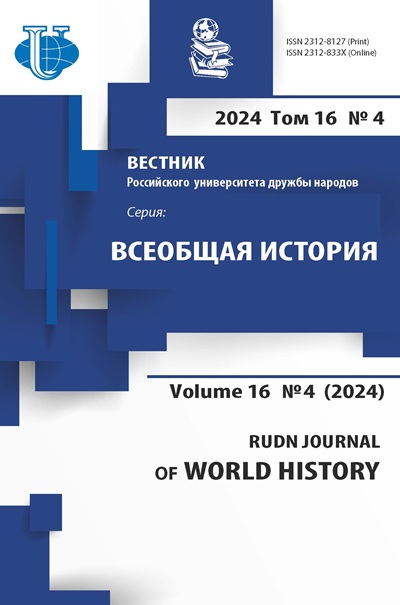No 2 (2011)
- Year: 2011
- Articles: 10
- URL: https://journals.rudn.ru/world-history/issue/view/123
Articles
Editor's note
RUDN Journal of World History. 2011;(2):5-6
 5-6
5-6


Typical features of Spanish culture as a paradigm of the national identity archetype
Abstract
This article highlights some characteristic features of Spanish culture lined up in the paradigm of the national identity archetype and attempts to explain their occurrence through the characteristics of the historical development of the country.
RUDN Journal of World History. 2011;(2):7-21
 7-21
7-21


Spain in North America: first written sources
Abstract
The article deals with the Spanish (pre-«Mayflower») period in North American History. The author examines the scope and availability of the documents of the period - both manuscripts and printed works and provides annotations for the most important ones among them. The author considers it necessary that the Spanish period of America be reintroduced as an important stage in US history.
RUDN Journal of World History. 2011;(2):22-35
 22-35
22-35


Greater Panathenaia: In the Shadow of the Olympic Games
Abstract
The article deals with the Greater Panathenaia, the Athenian festival celebrated every four years in honour of the goddess Athena. Greater Panathenaia was introduced in Athens in 566 B.C. Peisistratos renewed it with increased splendor and had turned a new Athenian holiday with the magnificent programme and unique prizes in an event aimed to consolidate the international authority of Athens.
RUDN Journal of World History. 2011;(2):36-47
 36-47
36-47


Nation or muslim community. Islamic world in search of identity
Abstract
The article studies the ideology of nationalism and Islamism as factors in the self-identification of the Muslim East. The author notes that nationalism and Islamism are united by their opposition to Western culture and values, to the concept of globalization. They are a protective shield against Western socio-cultural and economic expansion. However, this common objective of both ideologies does not eliminate the inherent contradictions between Islamism and nationalism. Both state nationalism and Islamism are obsolete in a globalizing world. The future belongs to Neo-nationalism, which is a synthesis of ethnicity and self-identity, which manifests itself in the growth of ethnic consciousness, a desire for territorial and ethno-cultural autonomy, in the aspirations of political leaders, who advocate the preservation of identity and the simultaneous access to the global world.
RUDN Journal of World History. 2011;(2):48-71
 48-71
48-71


Bulgaria in Britain's «Balkan game» in the early 20th century
Abstract
The article is aimed at defining Bulgaria's role in Britain's «Balkan game» in the decade preceding World War One. It is stated that the Foreign Office had to take into consideration various factors both global and regional character while moulding Britain's policy in the Balkans. The Anglo-Bulgarian relations in the early 20th century are viewed as an example of interaction between the great power and the small state in the region.
RUDN Journal of World History. 2011;(2):72-87
 72-87
72-87


First «encounter» with Bartolomé Esteban Murillo
RUDN Journal of World History. 2011;(2):88-90
 88-90
88-90


Holy Women in the late Byzantine
Abstract
The focus of study is Hagiography, i.e., writings on the lives and miracles of saints, in the late Byzantine. The attitude of Byzantines toward female saints reflects their general ambivalence about women. The numbers of female saints provided with vitae are very low. The author shows that a definite transformation in type of female saint occurs over time, and explores the vitae of two Byzantine holy women - Matrona from Сhios who entered monastic life, and Xenia Irina, married woman, who attained sanctity without ever having taken monastic vows.
RUDN Journal of World History. 2011;(2):91-98
 91-98
91-98


Pages from the life of the Universal History Department: The way it all began
RUDN Journal of World History. 2011;(2):99-107
 99-107
99-107


Our authors
RUDN Journal of World History. 2011;(2):108-109
 108-109
108-109
















